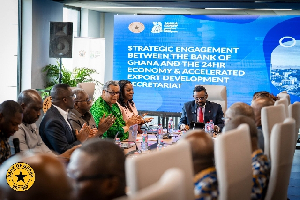I was stunned to notice this morning that a brief rejoinder
which I wrote in January after a night out was actually published and attracted
numerous comments. Three categories of
comments grabbed my attention in particular. The first seemed to agree with me and
offered
advice as to how to go about writing articles for publication on the web. The
second was made up of practical suggestions of how government could and should
raise revenue by implementing proper tax collection mechanisms. The third, perhaps
the most interesting, was made up of insults for me, the government, other
people and comments on issues that had nothing to bear on the reasoning of the
article. It was interesting to see how commentators in the last category
expressed their views. But this is not surprising at all. To me, it is a sad
reflection of the politics of insults being obtruded by some members of our
nation’s political sphere. However, the
mere thought that a section of young and well-meaning Ghanaians will read and
engage in critical reflections and discussion on issues highlighted in rational
articles, has encouraged me to write this one.
A
general news publication on this webpage dated Thursday 1st of
September, quoting Joy Online as the source, highlighted an important question
as its title. “Where are the projects
for Mills’ mega loans?” Nana Addo Danquah Akufo-Addo asked, during his major
policy statement at the first ever Liberty Lectures organized by the Danquah
Institute.
I
burst out laughing after reading the first couple paragraphs of the article. My
laughter was not because the question posed by the flag bearer of the NPP was
hilarious. My laughter was because the question reminded me of a similar
question asked on Facebook, quite recently, by my good friend Davis Adu Larbi,
who is a lecturer and promising young economist. In his, he posed the question;
Are government bonds net wealth?
Upon
first sight, nothing seems funny with both questions. However, a quick analysis
of both questions in light of the economic situation suggests to me that our
politicians and academicians now seem to be as confused as ordinary Ghanaians who
have been crying that government published statistics on economic growth are
useless because it is not reflecting in their pockets. Now our politicians and
economists are
singing a similar hymn but in different dialects. Now that is the funny side of the
whole
situation.
To understand the easier
question asked by the NPP flag bearer, let us try to answer that posed by my
good friend. Are government bonds net wealth?
This question has always been a difficult but interesting one to answer.
This is because one’s riposte depends on their characterization of Ricardian
Equivalence (RE). The RE as the time-path of macroeconomic aggregates is
independent of the time-path of the funding (i.e funding derived from taxes).
If one assumes that government spending of capital from bonds is beneficial to
the general economy, then one can answer yes to the question. However, if one
views government bonds as - a cognitive illusion - (that bonds are in your hand
right now, while future taxes seem far away, as argued by Robert Barro 1974)
then his answer to the question will be No.
Wait!!! do not be put
off by the economic grammar of the paragraph above. I am not an economist but I
am not totally ignorant in matters of economic theories and policies either. So
put plainly, Government bonds are simply disguised government borrowings. So the
question is can the money raised from
borrowing be part of Ghana’s net wealth?
If I
were to rephrase the question and ask; are corporate bonds net wealth? The
answer becomes yes (at least theoretically). Allow me a moment to explain. Say,
if Vodafone raises say 10,000 Gh cedis through bonds that I purchase, that sum
although capital to the company, is in reality, money the company owes and
needs to repay to me at a later date. Therefore in effect, the 10,000 is a
liability on the company’s balance sheet. It will put the money to work and pay
it back. Now because Vodafone will have
to pay me back, it will charge higher markups. (Mark ups are the small profit
margins that retailers gain when an item is sold. The amount we pay is not what
the item is actually worth. Markup is the small amount of money the business
owner tacks on to cover expenses and overhead costs such as rent, electricity,
heating, etc.). These markups will be charged to all Vodafone service users
until enough money is raised to cover the 10,000 Gh. Cedis that Vodafone
borrowed from me through bonds.
But although the company, in reality, owed me 10,000, that corporate bonds are
included in a vodafone’s net wealth, because we see companies as being
productive since we can physically see what they put on the market. So for
example, Vodafone might introduce the latest cell handsets or
mobile internet or internet modems etc. So whiles I could not have invented
these gadgets by myself with my 10,000 Gh. Cedis, at least Vodafone is able to
use it to increase productivity, or supply
capacity for the good of Ghanaians in
one way or the other. Hence that corporate bond or borrowing of 10,000
represents a part of Vodafone’s Net wealth of because that capital had been
used productively to generate more capital and to add value to the lives of
Ghanaians.
So to answer the question; are government bonds
net wealth? One must follow the same steps. Government raises capital for its
expenditure (construction of roads and affordable housing, health, education
etc). The trick here then becomes what and how one thinks of the
characterization of government’s borrowing and expenditure.
You see if government borrows, then what that
government is doing in effect is taking money from the future generation, the
future economy, to spend presently.
Let’s rephrase this; every $1 borrowed by the present administration to
spend now, is one dollar that would have to be paid in the future by my
generation (I am 31yrs now). And so unless we, the public and the citizenry of
Ghana, can see that capital from the borrowings being put to productive venture
for the public’s benefit as explained in the example with Vodafone under
corporate bonds, then it is very likely that one will answer a big NO to the
question of whether government bonds are net wealth. If the future generation
of our beloved nation would need to repay the bond purchasers or our lenders,
but has gained no public benefit from the capital (i.e. no subsidies in
tertiary education fees, or low fuel prices but instead high food prices,
increments in water prices etc.) then where is the wealth in this? I am afraid
this is how many Ghanaians feel as they do not see the existence of proper
public goods and services.
On
the other hand, If you take the view that government borrowing and expenditure
can be put to the production of proper and functional public goods and services
(good policing, security and public safety, roads & rails for transport,
good legal systems, good public schools, healthcare, affordable housing, etc,),
then the Ricardian Equivalence, which states that governments bonds are not
actually net wealth, since they will have to be paid off by future taxes and so
what looks like an "money/asset" now is in fact also a
"liability" of equal value, becomes partly untrue. This is because
government expenditure of the capital from the borrowing would have been used
productively for the direct benefit of the public. So future taxes becomes similar
markups in
corporate bonds repayments. The public will
be happy to pay its taxes to repay the
bonds / borrowing because they would have seen the benefits directly (Jobs,
personal peace and security in our homes and roads, secure transportation
routes and systems, healthcare, education, functional and trusted judicial
system etc). In such a case, government bonds can be said to represent net
wealth and there the answer to the question becomes YES.
It
is on the basis of this second position that I tend disagree with commentator
who have lately been criticizing Obama’s administration for raising the US’
borrowing limit. The move is a classic
mechanism for ensuring a full economic recovery and growth after a
recession. Now is a different debate all
together. However, my point here is that where a country can see the direct
benefit of its borrowings, then its bonds and borrowings can be classified as a
representation of its net wealth.
If you have followed my analysis to this point,
then you can now see that Nana Addo’s question; “Where are the projects for
Mills’ mega loans?” during his major policy statement at the Liberty Lectures, and
the cry of not having money in their pockets seem to suggest that the public
and good citizens of Ghana are finding it difficult to identify any wealth in
the current spree of government borrowings.
In the sense of real time, when the proletariat are shouting the cries
of not seeing any money in their pockets, then it is of no good or use to keep
drumming the beats of data and
statistics of low inflation and high economics growth as in publications by the
statistical service in recent months.
Please
be careful not to repeat to me, in your comments after reading this piece, the response
given by Mr. Fiifi Quotey on radio, when he was called to comment on a policy suggested
by Dr. Paa Kwesi Ndum to improve living standards and help curb the
lamentations by the people of not seeing any money in their pocket. In his
response, the Hon. Deputy Minister eloquently speaking as usual, said that
government does not put money in peoples pocket and that the role of government
was to set up / provide infrastructure and pave the way through policies
implementation that will help the people to put money in their own pockets. His
subsequent comments were what I will personally describe as slight attacks on
the Dr’s intelligence.
This
is true that it is not the role of Ghana government, or indeed any government
for that matter, to drive around with trucks load of money to distribute to the
citizens to fill their pocket. But did
the minister really think that Ghanaians were so shallow in their economic
intelligence that we did not known this. If the people are crying of not seeing
money in their pockets, then in my humble opinion, maybe their cries should
suggest to his ministry and the Ghana government that the second part of his
response which echoed that the role of government was to set up / provide
infrastructure and pave the way through policies implementation that will help
the people to put money in their own pockets, is either non-existent or is in
existence but not having the desired effect and there needs to be reconsidered.
Just
this morning a question was posed by Adakabre (bless him) on Adom FM that “When
does government borrowing becomes irresponsible?” Again the deputy minister was
called to respond to comments made by Mr. Agyeman Manu of the Minority. This
presented a fine opportunity for the Mr. Fiifi Quatey to raise dissect issues,
address concerns, calm fears on governments proposed borrowings, assure and educate
the public on the benefits and even slip some good
political campaign in there, but instead what does he do, he attacks the NPP’s
flag bearer’s personality. I was driving
to work as I listened to the discussion and couldn’t help but bowed down my
head in shame and disbelief of such a wasted opportunity to educate us, the
public.
Allow
me to state at this point that the above paragraph is not an attack on the
deputy minister’s character. I merely want to state that when opportunities
present themselves on our air wave, ministers should seize such opportunities
to educate the people. Sometimes, getting the public to understand an issue or
a policy is actually all the politics that needs to be done at that particular
moment. If you can make the public see the benefits of the government borrowings,
that is all that there is to it. After all, the money being borrowed is for the
public’s benefit. Or is it not?
Borrowing
is good. It is not a bad thing. All big corporations were built with borrowings
in one way or form. All the great and developed nations were built on
borrowings. But the difference between them and us is that the public see money
in their pocket as a result of the projects and policies implemented by their
borrowings (so my kids’ education and healthcare are free and they receive
their benefits which goes to support their feeding and nappies) and Ghanaians
see no money in their pockets due to high fuel prices, shortages of energy such
as gas, increment in fees, exorbitant medical care bills etc.
So
in conclusion, government bonds can be net wealth, and people can have money in
their pockets, and government borrowings can be responsible all times, if and only
if government expenditure
is not made along political lines but on
projects and policies that the all
citizens of Ghana can see and benefit from. It has usually been the case that
when one party begins a good project that it did not finish before leaving
office, the successor party either totally neglects it or complete it
haphazardly. The shining example of Ghana COCOBOD and the successes it is
enjoying and the direct benefits being reaped by famers and their families goes
to show that borrowing can be spent to benefit the people. It is true in terms of
National Income
Accounting principles that “there cannot be net wealth growth without government
dept” but it must be said that government’s expenditure
must directly benefit the people. It there are functioning healthcare, judicial,
educational, security, infrastructural and transformational systems, then maybe
the public wouldn’t have to pay bribes and extra unnecessary fees to attract
favours or get officials to perform their normal functions or duties. Then maybe,
the public may see money in their pockets.
Opinions of Sunday, 4 September 2011
Columnist: Baabu, Prince Anim














